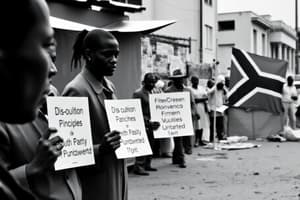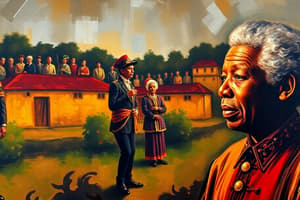Podcast
Questions and Answers
What was the main reason the United Nations' sanctions against South Africa in 1962 were unsuccessful?
What was the main reason the United Nations' sanctions against South Africa in 1962 were unsuccessful?
- Lack of support from Western countries (correct)
- Strong internal resistance from the South African government
- Insufficient evidence of human rights violations
- The sanctions were too lenient
Who formulated the Sullivan Principles to guide American companies in South Africa?
Who formulated the Sullivan Principles to guide American companies in South Africa?
- Desmond Tutu
- Nelson Mandela
- Reverend Leon Sullivan (correct)
- Martin Luther King Jr.
What was the objective of the Sullivan Principles?
What was the objective of the Sullivan Principles?
- To enforce government sanctions on South Africa
- To completely withdraw American investment from South Africa
- To encourage racially integrated work environments (correct)
- To promote apartheid policies in South Africa
What approach did the Republican Party in the United States take regarding South Africa during this time?
What approach did the Republican Party in the United States take regarding South Africa during this time?
Why were American companies hesitant to fully adopt the Sullivan Principles?
Why were American companies hesitant to fully adopt the Sullivan Principles?
What significant legislative action did the United States Congress take from 1986 to 1988?
What significant legislative action did the United States Congress take from 1986 to 1988?
In which year did the United Nations propose sanctions against South Africa?
In which year did the United Nations propose sanctions against South Africa?
Which of the following statements is true about the Sullivan Principles?
Which of the following statements is true about the Sullivan Principles?
What was a primary reason for American companies withdrawing from South Africa?
What was a primary reason for American companies withdrawing from South Africa?
Which British Prime Minister opposed sanctions against South Africa?
Which British Prime Minister opposed sanctions against South Africa?
What international development contributed to the pressure on the South African government to negotiate an end to Apartheid?
What international development contributed to the pressure on the South African government to negotiate an end to Apartheid?
Who was instrumental in starting the Release Mandela Campaign?
Who was instrumental in starting the Release Mandela Campaign?
What year did the United Nations adopt a resolution calling for the release of political prisoners in South Africa?
What year did the United Nations adopt a resolution calling for the release of political prisoners in South Africa?
What strategy did international trade unions use to oppose the Apartheid government?
What strategy did international trade unions use to oppose the Apartheid government?
What was the result of the successful economic sanctions against South Africa by the late 1980s?
What was the result of the successful economic sanctions against South Africa by the late 1980s?
When was Nelson Mandela finally released from prison?
When was Nelson Mandela finally released from prison?
Which regions were notably supportive of the anti-Apartheid movements?
Which regions were notably supportive of the anti-Apartheid movements?
What significant change occurred after 1974 regarding African states?
What significant change occurred after 1974 regarding African states?
What was the main goal of the South African Development Coordination Conference (SADCC)?
What was the main goal of the South African Development Coordination Conference (SADCC)?
Which countries were included in the Frontline States supporting the anti-Apartheid struggle?
Which countries were included in the Frontline States supporting the anti-Apartheid struggle?
Which factor limited the success of newly-independent African states before 1974?
Which factor limited the success of newly-independent African states before 1974?
What was South Africa attempting to do with an 'anti-Marxist coalition'?
What was South Africa attempting to do with an 'anti-Marxist coalition'?
Which of the following countries was NOT a Frontline State?
Which of the following countries was NOT a Frontline State?
What type of influence did trade unions have towards the end of the 1980s?
What type of influence did trade unions have towards the end of the 1980s?
What was one outcome of the air strikes by the South African Air Force?
What was one outcome of the air strikes by the South African Air Force?
What was the purpose of the Nkomati Accord signed in 1984?
What was the purpose of the Nkomati Accord signed in 1984?
How did South Africa exert pressure on Lesotho in the mid-1980s?
How did South Africa exert pressure on Lesotho in the mid-1980s?
What dilemma did African states face regarding South Africa's policies during Apartheid?
What dilemma did African states face regarding South Africa's policies during Apartheid?
What effect did international sanctions have on South Africa's economy?
What effect did international sanctions have on South Africa's economy?
What was one reaction of the Frontline States towards South Africa's Apartheid regime?
What was one reaction of the Frontline States towards South Africa's Apartheid regime?
Which large firm is mentioned as having disinvested in South Africa due to anti-Apartheid sentiment?
Which large firm is mentioned as having disinvested in South Africa due to anti-Apartheid sentiment?
What was a significant consequence of boycotts of South African goods?
What was a significant consequence of boycotts of South African goods?
Flashcards
Sullivan Principles
Sullivan Principles
A set of principles aimed at encouraging ethical business practices in South Africa, advocating for equal treatment of employees and a racially integrated environment.
Disinvestment
Disinvestment
The deliberate withdrawal of investments from a particular country, often as a form of political protest.
Sanctions
Sanctions
Economic measures imposed by one country on another, often to pressure them into changing their policies.
Constructive engagement
Constructive engagement
Signup and view all the flashcards
Apartheid
Apartheid
Signup and view all the flashcards
Economic isolation
Economic isolation
Signup and view all the flashcards
Harsher sanctions bills
Harsher sanctions bills
Signup and view all the flashcards
Tricameral parliament
Tricameral parliament
Signup and view all the flashcards
Frontline States
Frontline States
Signup and view all the flashcards
SADCC (Southern African Development Coordination Conference)
SADCC (Southern African Development Coordination Conference)
Signup and view all the flashcards
Anti-Marxist Coalition
Anti-Marxist Coalition
Signup and view all the flashcards
Post-1974 Transition
Post-1974 Transition
Signup and view all the flashcards
South African military buildup
South African military buildup
Signup and view all the flashcards
Trade Union Activism
Trade Union Activism
Signup and view all the flashcards
Organisation of African Unity (OAU)
Organisation of African Unity (OAU)
Signup and view all the flashcards
Limited Success of African Independence
Limited Success of African Independence
Signup and view all the flashcards
Economic Sanctions against Apartheid South Africa
Economic Sanctions against Apartheid South Africa
Signup and view all the flashcards
Commonwealth Split on South African Sanctions
Commonwealth Split on South African Sanctions
Signup and view all the flashcards
Effectiveness of Sanctions and Disinvestment
Effectiveness of Sanctions and Disinvestment
Signup and view all the flashcards
Release Mandela Campaign
Release Mandela Campaign
Signup and view all the flashcards
Nelson Mandela's Imprisonment and the Release Campaign
Nelson Mandela's Imprisonment and the Release Campaign
Signup and view all the flashcards
UN Resolution on Political Prisoners in South Africa
UN Resolution on Political Prisoners in South Africa
Signup and view all the flashcards
Role of International Trade Unions in Anti-Apartheid Efforts
Role of International Trade Unions in Anti-Apartheid Efforts
Signup and view all the flashcards
End of the Cold War and Apartheid
End of the Cold War and Apartheid
Signup and view all the flashcards
Boycott
Boycott
Signup and view all the flashcards
Why did South Africa need international investment?
Why did South Africa need international investment?
Signup and view all the flashcards
What was the impact of international sanctions on South Africa?
What was the impact of international sanctions on South Africa?
Signup and view all the flashcards
What were the effects of disinvestment on South Africa's economy?
What were the effects of disinvestment on South Africa's economy?
Signup and view all the flashcards
Study Notes
Disinvestment and Sanctions
- The UN tried to sanction South Africa in 1962.
- This was unsuccessful due to lack of support from Western countries.
- Western companies had economic interests in South Africa.
- Large profits and returns on investments influenced countries' decisions.
- The UN was seen as interfering in South Africa's domestic affairs.
- The anti-Apartheid movement had little success in imposing sanctions.
Sullivan Principles
- In 1977, Reverend Leon Sullivan proposed the Sullivan Principles.
- It aimed to guide American companies investing in South Africa.
- These principles called for racial equality for workers.
- This was difficult to maintain, especially for companies in South Africa.
- The principles acted as an attempt at sanction, despite not being a regulation.
- These were the first attempt at a US sanction.
Opposition to Sanctions
- The Republican Party opposed sanctions against South Africa.
- They preferred a "constructive engagement" approach.
- This used diplomatic means to persuade South Africa to change its policies.
Increased Sanctions
- Congress passed stricter sanctions from 1986 to 1988.
- They involved prohibiting or taxing investments in South Africa.
- This led to increased withdrawal of American companies and less trade with South Africa.
- A split occurred in Britain and the Commonwealth over sanctions in 1986.
Release Mandela Campaign
- Nelson Mandela was arrested in 1962.
- He received a life sentence in 1964.
- The United Nations supported Mandela's release.
- The ANC promoted his release.
- This encouraged the Release Mandela Campaign.
- Ahmed Kathrada started the campaign.
Role of International Trade Unions
- International trade unions (e.g., Norwegian Action Movement, European Confederation of Free Trade Unions) exerted influence.
- Negotiations and refusal to handle South African goods were tactics used.
- This pressured governments, especially in Scandinavia, Denmark, Britain, and African nations.
- This contributed to anti-Apartheid movements.
Support for anti-Apartheid in Africa
- Frontline states (Angola, Botswana, Mozambique, Tanzania, Zambia, and Zimbabwe) were particularly supportive of anti-Apartheid efforts.
- These states shared borders with South Africa and recently escaped colonial rule.
- Cooperation among these states grew stronger after 1974 (Portuguese colonies gained independence),
- The SADCC (South African Development Coordination Conference) was created to counter South Africa's influence.
- This aimed to balance South African power in the region.
South African Economy in Trouble
- South Africa's economy faced sanctions and disinvestment as global pressure increased.
- Boycotts and internal resistance significantly impacted the South African economy.
- These factors contributed to the end of Apartheid.
Studying That Suits You
Use AI to generate personalized quizzes and flashcards to suit your learning preferences.




